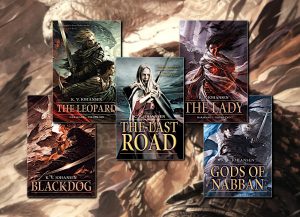Author Spotlight: K.V. JOHANSEN
Joining us for today’s Author Spotlight is K.V. Johansen!
Originally from Kingston, Ontario, K.V. Johansen has an M.A. in Medieval Studies from the Centre for Medieval Studies at the University of Toronto and another, in English Literature, from McMaster, where she wrote her thesis on Layamon’s Brut, an Early Middle English epic poem. She’s been writing fantasy since childhood and has a lifelong fascination with history, archaeology, trees, and language. She also plays guitar with great determination and dedication, moderate technical skill, and to her enduring regret, an utter lack of musical talent.
In addition to her secondary world fantasy for adults, she is the author of two works on the history of children’s fantasy literature, two short story collections, and a number of books for children and teens, some of which have won awards and various of which have been translated into French, Macedonian, and Danish. She lives in New Brunswick on the Bay of Fundy and spends too much time on Twitter @kvjohansen. Her website is at www.kvj.ca.
Welcome to the Hive, K.V. Johansen. Let’s start small: tell us about a great book you’ve read recently!
David Mogo, Godhunter, by Suyi Davies Okungbowa, is one I’ve really enjoyed lately. It’s a contemporary primary-world fantasy set in Lagos, in the disrupted society that follows the fall of the gods to earth. One of the things I like most about it is the main character, David, and the way he’s so determined to take care of people — his adoptive father, the teenager he takes on as a sister, and pretty much everyone else he encounters who needs him, including various gods, all the while being a bit on the messed up and angry side himself, sometimes badly in need of someone to take care of him. The world, too, is very vividly portrayed, bringing a pantheon of gods unfamiliar to me into modern life. Full of action, personal tragedies and victories, hope, humour, and very strongly conveyed affection between the characters — it’s a book I’ll likely go back and read again.
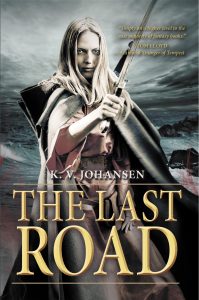
Cover by Jennifer Do
Okay, time to escalate things: reality warps and you suddenly find yourself leading a D&D-style party through a monster-infested dungeon. What character class are you, and what’s your weapon of choice?
I expect I’m a thief, something stealthy and on the outside of things, not really the leader at all unless I’ve gotten very annoyed at everyone else continually going the wrong way and setting off perfectly obvious traps. Weapon of choice, hmmm. Probably a knife. Which will not be much use against the monsters, so there’d better be some big brawny warrior types with swords and axes along to hide behind. That sounds a bit like Ghu’s philosophy, really …
And mine to be fair.
When you’re not trawling through dungeons, how do you like to work? (In silence, with music, or serenaded by the damned souls of a thousand dead shrimps? Do you prefer to type or to hand-write? Are you an architect or a gardener? A plotter or a pantser? D’you write in your underwear, or in a deep-sea diver’s suit?) Tell us a little bit about your writing method!
I need music when I’m working, although if I’m really deep into it, the music can end and I won’t notice. I’ve gone through various phases in the music of choice, each lasting years. For the past five or six years it’s been mostly rock or pop — Jethro Tull, Queen, Pet Shop Boys, Iron Maiden, Bowie, are favourites … some folk-metal, too — things with fairly complex music and lyrics that have some dimension. Or Eric Johnson — I like very guitar-focused music. I don’t find that having English lyrics playing distracts me the way it used to, unless I buy a new album. Then I have to listen to it properly a few times before I can work to it. I prefer to listen to a whole album straight through, and usually I’ll listen to all my albums by one artist over a few days, or my entire folk-metal or lute collection (lute and classical guitar are also important writing music for me), before switching to something else. It actually helps me concentrate.
I’ve been writing on a computer since 1987. My first book was written on my father’s computer and saved on 5 1/4 floppies. However, I keep a notebook for each project and fill that with research notes, sudden thoughts, scraps of dialogue, lists of the names of all so-and-so’s siblings, sketches of maps or layouts of buildings that I want to keep track of, random lines that I think I’ll have a use for later … But the real writing requires typing.
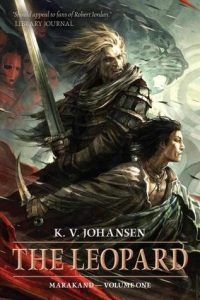 I usually start with a character in a situation; I’ll have an idea of where the story might be going that usually turns out to be completely different by the time I get there. I’ll write and rewrite and rewrite from the beginning, each draft getting further along, until I hit some moment where it all comes together and I can see my way to the end, at which point I can usually finish the book really quickly, and it’s a very polished, more or less final draft. That happens somewhere between half and two-thirds of the way through, that point where it all becomes an exhilarating wild rush downhill to the end. It can take a year or more to get there, though. Lately I’ve been trying to do more thinking before I start writing, to have some sort of an outline, because it’s hard to sell a book on, “It’ll all make sense in the end, trust me — it always has before.” My approach with the current project has been to write beginnings, then write an outline of where that’s going, then to decide that’s not what I want, scrap ten thousand words and the outline, and start again. I’m not sure that’s any more efficient, except that I now have the shape of the whole series for the WiP, and I know quite vividly how much of it is going to go — so I’ve gotten stuck on the protagonist’s voice instead. Always something new to wrestle with … but once I get that little matter sorted it ought to just burn along, I think. I hope …
I usually start with a character in a situation; I’ll have an idea of where the story might be going that usually turns out to be completely different by the time I get there. I’ll write and rewrite and rewrite from the beginning, each draft getting further along, until I hit some moment where it all comes together and I can see my way to the end, at which point I can usually finish the book really quickly, and it’s a very polished, more or less final draft. That happens somewhere between half and two-thirds of the way through, that point where it all becomes an exhilarating wild rush downhill to the end. It can take a year or more to get there, though. Lately I’ve been trying to do more thinking before I start writing, to have some sort of an outline, because it’s hard to sell a book on, “It’ll all make sense in the end, trust me — it always has before.” My approach with the current project has been to write beginnings, then write an outline of where that’s going, then to decide that’s not what I want, scrap ten thousand words and the outline, and start again. I’m not sure that’s any more efficient, except that I now have the shape of the whole series for the WiP, and I know quite vividly how much of it is going to go — so I’ve gotten stuck on the protagonist’s voice instead. Always something new to wrestle with … but once I get that little matter sorted it ought to just burn along, I think. I hope …
I write best early in the morning, before breakfast, or in the evening, but I try to work all day when I can get a day without interruptions. “All day” of course involves several breaks for dog-walking.
What (or who) are your most significant fantasy influences? Are there any creators whom you dream of working with someday?
Tolkien, McKillip, Cherryh, Louise Cooper, Glen Cook — those were the fantasy authors who really shaped my writing.
I’m not sure I’m cut out for co-writing, being someone who has to do so much thrashing around to figure out where I’m going. I mean, there’d be murder done, wouldn’t there? “No, no actually, what’d work way better is — I know we’d have to throw out five chapters but –” There is a short story or maybe novella in Tom Lloyd’s God Fragments world that I was going to do, but I got sidetracked wrestling with my own next book(s) so it’s still languishing as a folder of notes on my desktop.
Perhaps it would be better for your health if you avoided co-writing…
What was the last thing you watched on TV and why did you choose to watch it? Alternatively, what games have you enjoyed recently?
The last thing I watched on TV was Endeavour. I didn’t like the original Morse show, and I don’t like the books — that Morse is a bit of a creep. But I liked Lewis and I like Endeavour. The acting and the stories are very good.
The world shifts, and you find yourself with an extra day on your hands during which you’re not allowed to write. How do you choose to spend the day?
Can I have a nap? Wait, no, can I teleport? If I can teleport, I’m going to forego the nap and spend the day wandering around Kew Gardens. I had one day there while I was at LonCon in 2014 and it was not nearly enough. It’s really one of my favourite places of all that I’ve seen in my travels. I dream of going back (sometimes literally).
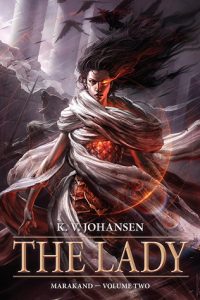 Can you tell us a little something about your current work(s) in progress?
Can you tell us a little something about your current work(s) in progress?
After I finished The Last Road I wrote an entire book set in the here and now, with an interweaving past and present timeline and no fantasy element at all, not even a ghost, although one of the protagonists does have long conversations with his dead brother. That was a really refreshing change of pace. It’s a book about rock music, gardens, persistent depressive disorder, and falling in love. Parts of it are quite funny. Maybe I need a better pitch! (I’m no good at pitching or self-promotion, can you tell?) I’ve been shopping it around –we’ll see what happens. It did make me start playing guitar again, so at least there’s that.
My current work in progress is set in a much smaller world than Gods of the Caravan Road. (At least, the part that the characters and plot are concerned with doesn’t cover an entire continent.) It’s mostly forest, and the forest itself is very much a presence throughout the book. I want to capture that feeling of old tales, where the woods is vast and mysterious and dangerous, a thing that might tolerate humans along its edges, but which is dangerous, uncanny, maybe unknowable, the deeper you go.
What’s the most (and/or least) helpful piece of writing advice you’ve ever received?
The most helpful was not advice, as such, but during my B.A. the head of the English Department, a poet, told me to go give some writing to the newly-appointed writer-in-residence, another poet, so to make him happy, I did so. The next day I got a lovely note in my mailbox, hastily written in red ink on that canary-yellow scratchpad paper you don’t see anymore, saying, “Congratulations, I have just read a professionally-written short story…” That was the beginning of a long friendship with the poet Douglas Lochhead. It wasn’t that he ever gave me a particular life-changing piece of writing advice, but over the years his encouragement and willingness to read very long fantasy novels, a genre that he otherwise didn’t read, and to read them seriously as literature and critique them accordingly, was priceless.
Every writer encounters stumbling blocks, be it a difficult chapter, challenging subject matter or just starting a new project. How do you motivate yourself on days when you don’t want to write?
“If you don’t write it, nobody else will.”
Dark chocolate and a fresh cup of tea?
If it’s just a case of having ground to a halt, I’ll go back and read through the thing from the beginning, up to the point I’m stuck at. Often that helps me see that I’ve gone down the wrong path somewhere a chapter or so earlier, so I can backtrack and start again. When I’m really feeling exhausted and discouraged and that I just don’t want to write, sometimes it helps to read something finished, instead, something I know is some first-rate writing, the bits that give me shivers, to remind myself, “Yeah, you can do this, this is — wow, did I really do that? And remember how you agonised over that one …? See, you’re good, it’ll be okay.” But there are times that doesn’t help at all. Sometimes you have to remember that you’re writing this story because under all the adventure and gods and battles and whatnot, there’s something in it, probably deep in the characters, that you need, and if you need it, probably there are other people out there who do as well.
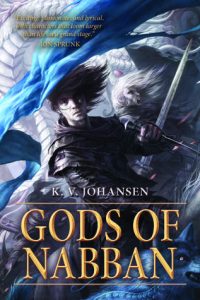 Besides, you can’t go wrong with a good cuppa.
Besides, you can’t go wrong with a good cuppa.
If you could visit any country at any point in history, where/when would you go, and why?
It would be very interesting to experience some of the Old English poetry as it was actually performed, in a hall, all firelight and shadows. Bede’s account of Caedmon, insisting he can’t perform when everyone’s taking a turn, passing around the harp, and then being given the divine inspiration of poetry suggests the recitation had music involved. Beowulf, “The Wanderer,” “The Seafarer” — there must be so many that have been lost, too. I want to hear the rest of the “Finnsburgh” story. It must have been as long as Beowulf, once. I’m getting a magical, greatly-improved mastery of OE, right?
Tell us about a book that’s excellent, but underappreciated or obscure.
Louise Cooper’s Time Master trilogy of The Initiate, The Outcast, The Master, published in 1986-1987, is something that’s fallen into obscurity now, and yet it’s such an outstanding story. It clicked with the kind of thing I was trying to write and that I wasn’t finding in contemporary North American fantasy when it came out. Seven gods of Chaos, seven of Order; for a long time Chaos and its servants ruled the world, but they were eventually overthrown by Order and are now all but forgotten save as a dark and terrible time. A man, rejected by his family, becomes one of the most powerful sorcerers of the Star Peninsula, but is tormented by a nightmare being driving him towards remembering something long forgotten, and a drover woman becomes entangled in the mess through her friendship with and attraction to him.
Or, since spoilers are allowed, right? a god seduces a young woman and conceives himself so as to find a way back into the world for a banished pantheon. The style might seem a bit old-fashioned now, hint of an omniscient narrator, and in the second book, I never felt comfortable with the ambiguity of the consent in the main characters’ first sexual encounter, despite their wholehearted holding to one another in the face of death and eternal damnation throughout, but I’m rereading them right now and finding them as vital and enthralling as they ever were.
Cooper went on to write two more adult trilogies in that world, Chaos Gate, set later in the Age of Balance, and Star Shadow, set during the period when the gods of Chaos were worshipped alone. The latter is very dark and disturbing. My sympathies tend to lie with the gods of Chaos, because of Tarod and the first books, of course, but their priests and servants in that earlier period are a mix of outright psychopaths and people torturing and sacrificing because it’s what one does, and the result is something with interesting characters that I nonetheless don’t go back and reread, though maybe I should, to reassess it. She also wrote a very good YA trilogy set after Time Master, Daughter of Storms, also in the Age of Balance, about three teens and a demon trying to use one of them to upset the balance between the fourteen gods — well worth looking for.
Can I have a second one? Briefly? Roger Taylor’s Chronicles of Hawklan. The first book, The Call of the Sword, came out in 1988. A man with amnesia who finds an ancient, abandoned castle opening to him, his sardonic one-legged talking crow companion … Do read that four-book series, if you can find it. Heroism, philosophy, and delight in life standing against evil, and one of the first series I came across where women inclined to get on with the sword-bearing soldiering and the heroing just do it without a lot of fuss and specialness. And Gavor the crow is a delight. The appeal of both this and Initiate is not they had black-haired, green-eyed, amnesiac, grown-up heroes, and that I had been writing something with a black-haired, green-eyed, amnesiac grown-up hero since 1984, but … is it some Jungian archetype or something? (The Call of the Sword has a black sword, too, as did my 1984 ur-story, which I only finally abandoned in the writing of Blackdog two decades later. You’ll notice I kept the sword.)
I deliberately didn’t let Holla-Sayan or Ahjvar be black-haired and green-eyed, though they both were cannibalizations of that protagonist of my ur-story, but in the WiP I’ve let my hero-type finally get the phenotype back. And the amnesia? Well, you’ll have to wait to find out.
Finally, would you be so kind as to dazzle us with an elevator pitch? Why should readers check out your work?
The Last Road is the conclusion of Gods of the Caravan Road. It’s silk road fantasy in a world where gods and goddesses are local powers, protected by as much as protecting their folk, and devils bound to once-human wizards seem willing to destroy the land for their own unknown ends. Now one of these has declared himself a god and leads his followers east, devouring the true gods and goddesses of the earth as he comes, and he’s trying to use the demon werbear Mikki, once the lover of the devil Moth, against her. Moth is angry. Things will burn.
That’s fantastic, thank you so much, K.V., and good luck with the release of The Last Road!
K.V. Johansen is the author of the GODS OF THE CARAVAN ROAD quintet. The final book, THE LAST ROAD, will be released on October 22nd 2019 (tomorrow!)
